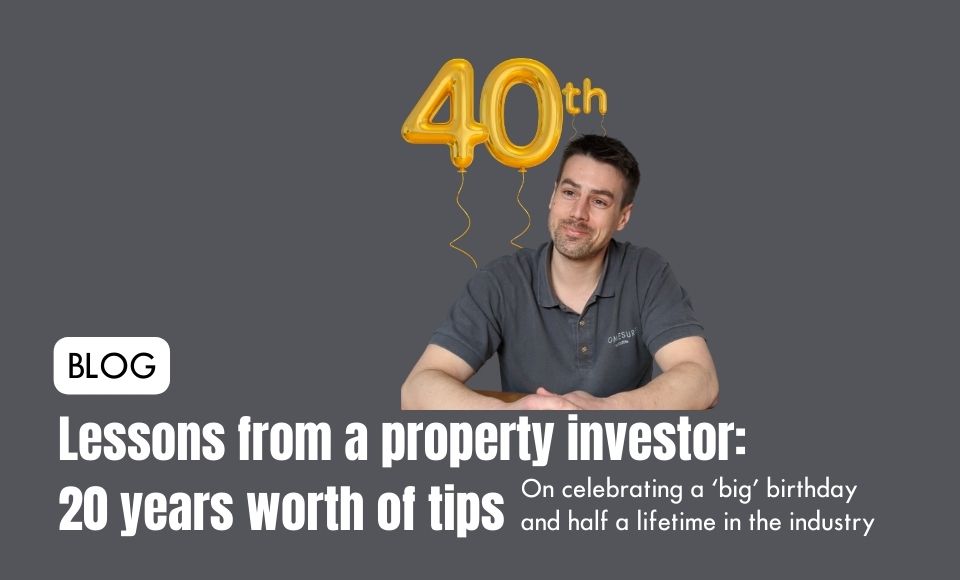I completed on my first house purchase three days after I turned 20-years-old. I turn 40 this week, so I’ve owned and managed property for half my life. Since starting Homesure Property in 2007, I’ve also overseen 4,000+ tenancies on behalf 1,500+ private landlords.
In this post, I’ll give you a list of timeless principles I’ve learned. Settle in with a cuppa, I’ve picked up quite a few tips along the way!
Decide whether you’re an investor or a landlord
A property investor puts their money to work and delegates decision making to a managing agent like us. In contrast, landlords take on a lot of the decision-making themselves, which creates work. They might still appoint an agent to execute their decisions.
Investors focus on “money in, money out” and treat property as an “asset class” alongside a diversified portfolio of stocks and shares, pensions, ISAs etc.
One is no better or worse than than the other. To decide which one you want to be, I recommend putting a cost on your own time. That’ll help you decide whether you’d rather do the work yourself, or outsource decision making to a property agent. Make sure to choose one you can trust, who aligns with your vision, societal values and decision-making framework.
Put the work in upfront to choose a good agent, then let them make all the small decisions for you, if you want an easier life.
Treat your tenants well

Be kind. Remember that you’re profiting from someone else’s home. Their sanctuary. Their safety. Take it seriously and remember how upset you get when your heating breaks or your roof leaks. Remember how stressful and emotional a home move is for all of us.
Assume the best in people, and plan for the worst. That way you’ll be pleasantly surprised or prepared.
Plan for situations, not events
Be content with the worst-case outcome, not the best. Input higher expenses (fees, repairs etc) and lower income (rent and voids) when making your calculations. If the deal stacks up on that basis, you can’t lose!
Guarantee your profits
I’m still amazed that some landlords choose not take to out Rent and Legal Protection Cover.
It’s a unique investment that allows for spending 3% of your income to guarantee 100% of it coming in. Not taking out this insurance puts circa 25% of your investment at risk.
Why put your investment, sleep, and sanity at risk for a few pennies?
Value contractors and tradespeople
Your tenant’s opinion of you as a landlord will be largely based on how quickly, and competently, you carry out repairs. That means relying on third parties to work on your property and liaise with you tenant.
You need to build relationships with trades (or you can leave that relationship building to your agent, if you have one) in order to get work done quickly, correctly, and competitively.
There’s a shortage of contractors. If you piss them off by wasting their time getting too many quotes; being fussy about job specs (when they’re the experts); and – the cardinal sin – not paying them quickly, you don’t burn just one relationship. You damage your relationship with your tenant too.

Pay your taxes
The unique opportunity of investing in property is leveraged investment against inflation-beating assets, so you need to be able to borrow as much money as possible.
Your ability to borrow is based on the income that you report to HMRC. When you declare every pound of income, you can borrow 5x that amount to reinvest.
I’ve chosen to pay MORE tax in my career (eg. not claiming for smaller expenses, or using oft-reported tax avoidance schemes) in order to pay more tax. So I can borrow more, so I can invest more, so I can generate more income to reinvest into more assets…
Never repay a mortgage
Paying just the interest on a mortgage goes against conventional wisdom. People are programmed to want to get rid of debt as soon as possible. But not all debt is bad debt!
If you’re not comfortable with the idea of owing the same amount at the end of the mortgage term, as you did at the start, you may need to re-think property investment. To help you get comfortable, remember that this risk is mitigated by the very reason you invest in property – inflation.
If borrowing every penny you possibly can scares you – you’re unlikely to become as wealthy as you want to be. You have to be able to tolerate risk.
Don’t flip unless you’ve got the stomach for it
 Flipping properties (buying with the intention to sell it on quickly, usually after refurbishment) is a high-risk, high-return endeavour. It ties up a lot of capital, requires fast movement on works, and defers control on the final profit to the market. In other words, you’re betting on how much the market says your property’s worth when you’re ready to sell.
Flipping properties (buying with the intention to sell it on quickly, usually after refurbishment) is a high-risk, high-return endeavour. It ties up a lot of capital, requires fast movement on works, and defers control on the final profit to the market. In other words, you’re betting on how much the market says your property’s worth when you’re ready to sell.
Flipping can be done very profitably by skilled operators who, crucially, have the correct temperament for the stresses involved.
Speculation is dangerous. Markets can move quickly, without warning, and take a long time to recover.
Be particularly careful adding bridging finance to this.
Learn about the 18-year property cycle
 Time IN the market trumps TIMING the market but there’s no harm in trying to improve the odds of entering, refinancing, and exiting the market by being aware of macro-economic events.
Time IN the market trumps TIMING the market but there’s no harm in trying to improve the odds of entering, refinancing, and exiting the market by being aware of macro-economic events.
Learning about this historical principle will increase your chances of buying at the right time; selling at right time; and ensuring you are ready to pounce (ie. having cash on hand) when opportunities present themselves.
Tenant-proof your property
You know that drawer in your house that’s dodgy? The one you have to use a particular knack to open? Don’t have a draw like that in your rented properties.
Make it easy for tenants to meet the demands of their obligations, ie. maintaining the condition of the property.
Some tips:
- high-powered extractor fans with delay timers in bathrooms (to avoid mould growth)
- no floor tiles (to avoid expensive repairs) – use vinyl in kitchens & bathrooms
- carpet underlay, at least on high wear and tear areas like stairs
- silicone seals around the bath, bathroom floor, sinks etc. (to avoid water leaks)
- painted walls, not wallpaper (for easy touching up & redecoration)
- high gloss white to the woodwork (easier to clean, more satisfying once cleaned)
- Remember that water goes wherever it wants, whenever it wants and you can’t stop it. Look after your roof. And your gutters. Clear gutters and downpipes annually (to avoid leaks, damp patches, mould growth)
- install fan-assisted, electric ovens (no-one wants to wait longer for their roasts)
- ensure windows are silicone sealed on the outside (to avoid rainwater penetration which causes mould growth)
- install a mains-connected whole-property ventilation system (to ensure proper ventilation throughout at all times and avoid condensation)
- damp-proof the property fully & properly (damp is incredibly disruptive – do it right from day 1)
Get the move-in right, on day one
Where there’s friction there’s frustration. Tenants won’t – and shouldn’t – have to suffer through faulty or dodgy items. They’re paying the same rent as if everything was working fully, so why should they?
Small things add up. A few minor snags when a tenant moves in is often glossed over by the excitement of moving day. But if there are endless snags, the annoyance of each one is multiplied into a much bigger calculation.
Get this wrong and your tenancy has crashed before it’s even taken off.
Follow the golden rule
Any landlord who provides housing that they themselves wouldn’t feel safe living in is a “slumlord”.
Never let emotions get in the way of your success
Don’t react to events – respond.
Don’t serve notice on a tenant because they pissed you off.
Use your decision-making framework to assess your next move against long-term strategy. This may mean “losing a battle” to win the war. It might mean doing something you shouldn’t have to do in order to do something you want to do.
Perhaps your tenant has decided the light in the hallway is beyond reach and they want you to change it. That’s demonstrably the tenant’s responsibility. But how much will it cost you to do versus not? Perhaps your tenant has been there for a long time, or you would need to fully refurbish the property in order to find a new tenant.
Remember, less is more
Give your tenants reasons to never move out – affordable rent being one of them. It’s all about occupancy, not maximising the monthly rental income.
Voids are expensive, so do everything you can to shorten them.
Proceed with caution when it comes to rent increases:
- Some tenants will move out (void cost)
- Some tenants will argue (relationship damage)
- Some tenants will agree out of fear (and harbour resentment)
- Some tenants will make you pay with repair requests
In all of these instances, your relationship with your tenant is now damaged, and what for what? A few extra quid?
When you need to increase rents, set the figure below the current market rent (the figure you’d get if you were to re-let to new tenants). Think of it as a ‘loyalty discount’ for your tenants.
Stay out of jail
 Never ignore the rules. You’re dealing with peoples’ homes, so it’s right that there are rules and regulations in place.
Never ignore the rules. You’re dealing with peoples’ homes, so it’s right that there are rules and regulations in place.
If you’re a landlord, you need to get to grips with every piece of legislation that affects you. If you’re an investor, you’re still 100% liable, so you need to chose your agent carefully. Their actions will affect your ability to operate.
Look for diamonds in the rough
Don’t assume that ‘rough’ areas must be avoided.
In 2015, I started buying properties in Speke, L24, for me and my clients. A few years later, after excellent high rental yields, the value of the properties doubled. Now, investors are nigh-on priced-out of the area as the trend has shifted.
How did I identify Speke as a good area? I focused on fundamentals. At the time, you could get a damp Victorian terraced house in north Liverpool for the same price as a 1960s-built semi-detached house with gardens and off-road parking in Speke. And it has much better transport links to the city centre, shops, jobs, and neighbouring towns and cities. No-brainer!
Remember that things come back into fashion
 Property is a long-term (20+ years) endeavour. When you’ve been involved for a decade or more, you’ll see changes in areas. Most importantly, you’ll figure out why an area changed and use this information to pick your next area to focus on.
Property is a long-term (20+ years) endeavour. When you’ve been involved for a decade or more, you’ll see changes in areas. Most importantly, you’ll figure out why an area changed and use this information to pick your next area to focus on.
For example, I’ve seen Wavertree, Liverpool (L15) go through dominant demographics of:
- multi-generational families
- students
- asylum seekers
- young professionals and new families
- students (again)
Embrace the power of the snowball effect
Compounding takes advantage of this, and it’s the most powerful force in the world.
It works like this. If you take money out of your investment now, you forgo exponentially massive returns later. In terms of property investment, if you withdraw your portfolio’s rental profits, you won’t benefit from compounding over the long term.
Don’t increase your personal overheads/lifestyle in line with rental profits. If you do, you not only miss out on compounding, but your lifestyle will be at the mercy of short-term impacts, such as a spate of boiler breakdowns, a new roof or two, a tenant who won’t leave and needs to be taken to court…
Your portfolio’s success should be completely elastic to your lifestyle. Choosing not to make drastic changes to the way you live, allows your investment to grow at a much greater rate.
@homesureproperty Property investors, this one’s for you. Making the distinction between getting rich and building wealth will impact the approach you take to investment. And that could be the difference between gambling on the property market vs retiring early with a lucrative property portfolio. The moral of this story is, invest strategically – it’s better for your mental health AND your bank balance! #investwisely #investorlife #goodinvestment #propertyinvestment #propertyinvestmentuk #propertyinvestmentspecialist #entrepreneurinspiration #liverpoolbusiness #entrepreneurship #propertyinvestmentadvice ♬ original sound – Homesure Property
Don’t be short-sighted when it comes to negative equity
Who cares if the value of your property fluctuates – even into negative equity – while you own it?
If you’ve tied into a long-term fixed-rate mortgage (which is recommended), have good quality long-term tenants with Rent and Legal Protection in place, and take a long-term outlook, it doesn’t matter if it’s fallen in value.
During the 2008 financial crisis, 100% of my portfolio halved in house price value. But the interest rates went to rock bottom while my rents remained identical. I’ve never made more rental profits than when my houses were in “negative equity”. Give me negative equity and high income over the opposite any day!
Learn this refurbishment success mantra
“Double the budget and triple the time.”

Think, then act
If I had a pound for every time an aspiring investor has sent me a load of Rightmove links and asked “what do you think of these?”
I can’t answer the question because I don’t know what you’re trying to achieve.
Are you looking to replace your main income? Create a legacy portfolio for your kids? Build a pension pot for your early retirement?
Don’t start looking at or buying properties until you’ve thought about how you’re going to finance the purchase, pay tax on it and dispose of it. Build your portfolio with purpose.
Set up your systems and structure before buying your first property. Otherwise, you’re likely to buy the wrong thing – and probably in the wrong way.
Take it slow and steady
Numbers on a spreadsheet and polished videos on social media build excitement, and a fear of missing out. You’ll see the latest money-making trends (lease options, AirBnB, rent-to-rent etc).
I recommend building a foundation of investments before diversifying into a different strategy.

Know that ‘clean’ is subjective
In your figures, allow for a professional clean between tenancies. Even if your outgoing tenants put Kim and Aggie to shame, you’ll want to protect your rights to claim at a later date.
One person’s ‘clean’ is another person’s filth, so remove subjectivity. Focus on the objectivity of having an invoice showing a professional clean, and a photographic inventory.
Assume you will never win a deposit claim
You are less likely to have a successful claim than a tenant. All deposit protection schemes are highly biased in favour of tenants. Accept it and move on.
Even if you win, you’ll only receive a pro-rata amount of the cost of replacement in line with the ‘lifespan’ of the item. Apparently, carpets only have a life-span of 5 years. I don’t know about you, but mine last a lot longer!
You’re most likely to win for rent arrears (but you’re better off with Rent Guarantee and Legal Protection to allow for more deposit claims).
Don’t invest in property to the exclusion of all else
Don’t invest everything in buying properties. Keep a slush fund of cash relative to the value of your properties for repairs (I recommend 30% of rental income to cover agent’s fees, insurance, and repairs).
Don’t forget about stocks & shares, ISAs, pensions, etc.
Consider versatility
Investing in homes with the widest target market reduces your risk when demand from tenants is low.
If you buy a 5-bed HMO, only individuals or huge families will want to rent it. Likewise, a family can’t live in a studio or 1-bedroom apartment.
Buy flexible properties; not one-trick ponies. A 3-bed terrace is affordable to buy and can be rented by singles, couples, and families. It can even be converted to a HMO if needed.
Keep your ego in check
Friends and family always ask me how many properties I own these days.
I answer and they seem awe-struck. But a friend of mine has fewer than half the properties I do and makes more rental money with a greater value. Why? He has used a different strategy (students) and has invested much more capital than I have. So who is more successful? He is!
Don’t be tight with your buildings insurance
I once made a huge buildings insurance mistake on a low-value property.
I bought the property for £37,000 and set a rebuild cost of about the same. My naïve thinking at the time was ‘if it’s only worth this much on the open market, surely I could just buy another one for the same cost!’
It turned out that the rebuild cost was THREE times the house price. When I needed to make a claim, it was reduced based on the insurance I’d taken out.
It seems obvious now, but of course the cost of building work is completely irrelevant to the current – or future – value of a property.
To get an accurate rebuild cost when taking out insurance, visit ABI Public Rebuild Calculator.
Ask for help when you need it
Don’t be a hero.
You can’t be expected to learn all of these lessons before you buy your first investment property. Even if you have a whole portfolio, it’s almost impossible to keep up with changing legislation, not to mention marketing, contractor relations etc. unless you dedicate a significant amount of your time to it. So if your portfolio needs work, there’s no shame in that.
Start as you mean to go on – from this moment – whatever stage you’re at.
If you’re a new investor and you want to set yourself up for success, or if you’re an existing landlord who wants support to get your portfolio back on track, or sell it, book a free investor consultation with me or one of my fellow directors. Let’s make sure property is working for all of us, for the next 20 years!





